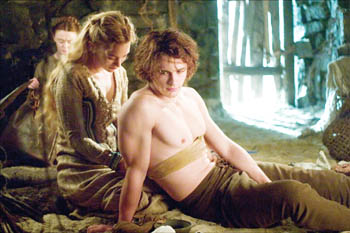![[Metroactive Movies]](/movies/gifs/movies468.gif)
[ Movies Index | Show Times | Silicon Valley | Metroactive Home | Archives ]

Photograph by Rico Torres The Birth of the Tanning Salon: A wounded Tristan (James Franco) tries to improve his skin tone with the help of Isolde (Sophia Myles). Prince Violent Kevin Reynolds obscures the brains and the brawn in adaptation of 'Tristan & Isolde' A TALE that has been taking care of itself for 800 years manages to withstand the direction of Kevin Reynolds in Tristan & Isolde. Palo Alto's own James Franco, of Freaks and Geeks, stars as Tristan, the lovelorn knight. Franco conducts himself as an actor who has been told one too many times that he looks like James Dean. In a dungeon scene, when his king comes to upbraid him, Tristan just keeps his eyes closed and winces; it's as if he longed to bleat out, "You're tearing me apart!" Sophia Myles plays the unfortunate Isolde—in fine, the Kate Hudson of Dark Ages England. In this take on of the story (Joseph Bédier's version is very readable), Tristan grows up in the chaos of post-Roman Britain. His lord, Marke (Rufus Sewell), raises him in preference to his own son. After a guerilla raid defeating Irish slavers—and their scar-faced, bald-headed champion—Tristan is mortally wounded and apparently dead. He is sent off on a Viking funeral that, like so much in this movie, fails to ignite. Landing in Ireland, Tristan is nursed to health by Isolde, daughter of his mortal enemy, King Donnchadh of Ireland (David Patrick O'Hara). Some political machinations end up with Isolde marrying Marke; and now the sin of adultery is compounded with the sin of treachery to a liege lord. The toneless script by Dean Georgaris tries to be fresh and off the cuff ("We both know this can't be"). The musical effect is Wyndham Hill rather than Wagner—plaintive piano notes against which the love triangle mimes indigestion or steps through a courtly dance that sounded awfully like the theme from Mahogany. The many battle scenes are, as always with Reynolds, furious scrimmages punctuated with the amplified sounds of watermelons being squashed as someone—but who?—gets it. As we've seen from Waterworld, Reynolds traffics in visual monotony; the pea-soup fogs and mists tinge this film in a palette of unappetizing gray-blue and dull creams. It is the post�Ridley Scott way of making the fabled past look like a rainy weekend. One might quickly recommend the Jean Cocteau version of the story, The Eternal Return, a modern-dress retelling that includes some of the details missing here: the faithful dog, the potions and a spiteful dwarf with a face like a foreshortened Orson Welles. While the acting may not be any more plugged in than in Reynolds' film, the aesthetics are up to Cocteau's usual high-level mix of the dreamlike and the austere, as in the shots of Jean Marais' smooth silver face lined with golden tears. Reynolds avoids the interesting angle on the story: the idea that God hallows a romance that a king cannot permit. This is proved by the legend's incident of Isolde surviving a trial by ordeal in which she swears her chastity—a chastity that even the 6-year-olds must know has been broached about a million times by Tristan. So this story advances Western civilization few notches. The movie makes no advance on any front; in the end, it is more proof that Rufus Sewell is one of those actors—like Terence Stamp, Frank Langella and occasionally Richard Harris—who can save a movie through sheer presence, through the lift of a heavy eyebrow, or decision to whisper a threat instead of bellowing it.
Tristan & Isolde (PG-13; 125 min.), directed by Kevin Reynolds, written by Dean Georgaris, photographed by Arthur Reinhart and starring Rufus Sewell, James Franco and Sophia Myles, opens Friday.
Send a letter to the editor about this story to letters@metronews.com. [ Silicon Valley | Metroactive Home | Archives ]
|
From the January 11-17, 2006 issue of Metro, Silicon Valley's Weekly Newspaper.
Copyright © 2006 Metro Publishing Inc. Metroactive is affiliated with the Boulevards Network.
For more information about the San Jose/Silicon Valley area, visit sanjose.com.